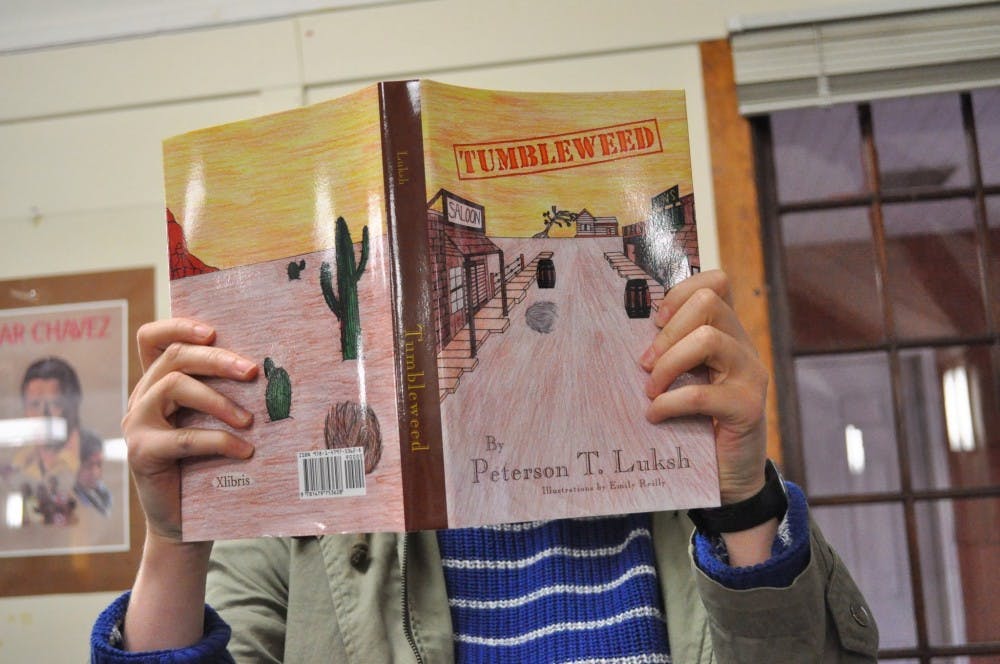Peterson Luksh has been stabbed by troubled teens, set up banquets at the Portland Zoo and lofted bunks in Shipstad Hall. Luksh’s favorite job, though, has been “Tumbleweed.”
In December 2012, Physical Plant employee Peterson Luksh self-published his first novel “Tumbleweed”. The book is set in a fictitious Nevada town that is tormented by a sinister villain.
Luksh hasn’t always had a career as an author or Physical Plant employee. Before he was hired by the University in August 2013, he studied criminal justice and sociology at King’s College in Pennsylvania with aspirations of becoming a police officer. His senior year, however, Luksh realized he had no interest in the profession. After working for two and a half years in a juvenile detention center, Luksh’s disinterest in a law enforcement career was further solidified.
“I worked at a juvenile detention center / boys’ home. They weren’t locked in but they weren’t allowed to leave either,” Luksh said. “That cured me of wanting to do anything law enforcement wise. I’ve been bitten, had my nose broken, I’ve been stabbed.”
Now it’s Luksh’s characters that are doing the stabbing. “Tumbleweed’s” antagonist, The Cajun, in particular.
“The outlaw is kind of a wildman from the bayous of Louisiana and his name is the Cajun. Kind of a very sinister fellow … he’s particularly dark,” Luksh said. “When his gang attacks a stage coach or a town or a bank, he usually picks at least one victim to use a knife on … a knife is his weapon of choice.”
Luksh’s novel is set in post-Civil War America, and the protagonist is a former Union cavalry officer.
“I’ve always liked the Old West - cowboys and outlaws and sheriffs. I like stories that take place before the advent of modern technology,” he said. “It’s a lot easier to create and sustain parallel situations when the telegraph is considered the pinnacle of technology.”
Having his work published and available for sale is a point of pride for Luksh.
“When I was actually holding it in my hand and it had my name on it … that was very satisfying,” he said.
But the satisfaction came at a cost for Luksh. The self-publishing provider Luksh used to print “Tumbleweed” charged $1,500 for its services.
“It cost too much, $1,500 dollars. For me it was a lot,” Luksh said. “I have not made that much back yet, I’m still in the red, as they say. I actually had to borrow money from family to make it happen.”
The publishing package Luksh purchased only included one round of copy-editing. After making changes to his original manuscript, Luksh had to revise his own work.
“I did, unfortunately, a lot of my own editing … Doing your own editing is a very bad idea,” Luksh said. “As I was reading the book, the actual book, I noticed a lot of spelling mistakes and I thought, ‘You amateur.’”
P-Plant isn’t Luksh’s only tie to UP. His father-in-law, Daniel Reilly, is the senior associate director of Admissions, and he’s read Luksh’s novel.
“I enjoyed ‘Tumbleweed,’” Reilly said. “I think it is a strong effort for a first-time author. I was impressed by Peterson’s vivid descriptions of characters, scenery, clothing, etc. Overall, a very entertaining story.”
Apart from writing, Luksh is also passionate about his faith. Luksh’s parish priest, Fr. John Dougherty, spoke to this side of the author.
“Pete is a great guy! Pete is a very prayerful and thoughtful man. His faith is extremely important to him and he truly lives it out on a daily basis,” Dougherty said. “He is very faithful to the Eucharist and serves on our Vocation Committee and is a lector at Mass.”
Luksh hopes to keep writing.
“I would love to be able to write for a living. Hopefully that will be a reality one day,” he said.








